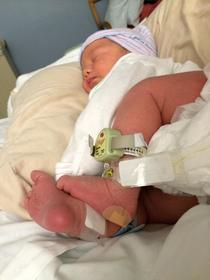SILVER SPRING, MD--(Marketwired - Sep 24, 2014) - The Association of Public Health Laboratories (APHL) has been awarded $4 million through a two-year cooperative agreement with the Genetic Services Branch of the U.S. Health and Human Services Health Resources and Services Administration (HRSA). In close partnership with the Colorado School of Public Health (ColoradoSPH), APHL will provide technical assistance, education, and financial support to state newborn screening programs in order fully implement testing for Severe Combined Immunodeficiency (SCID).
Babies born with SCID (also known as "Bubble Boy Disease") lack a functioning immune system and often die within their first year of life. Early detection through newborn screening allows for life-saving medical intervention. To date, less than half of US states screen for SCID. While many other states have approved the addition of SCID to their newborn screening panel, they have not yet been able to implement screening due to considerable challenges such as integration of new technology, the need for greater laboratory capacity and necessary training within the broader newborn screening system.
"Because SCID testing requires different technology and different clinical follow-up than the other conditions on HRSA's Recommended Uniform Screening Panel (RUSP), implementation has been out of reach for many states," said Dr. Marci Sontag, associate professor of epidemiology at the Colorado School of Public Health. "We aim to provide the support necessary to make SCID testing a reality around the country."
Jelili Ojodu, director of the Newborn Screening and Genetics program at APHL added, "Supporting state newborn screening programs in their effort to implement SCID testing means detecting this disorder in more babies and allowing them to get critical treatment. Our goals come back to one simple objective: saving more babies' lives."
The Association of Public Health Laboratories (APHL) works to strengthen laboratory systems serving the public's health in the US and globally. APHL's member laboratories protect the public's health by monitoring and detecting infectious and foodborne diseases, environmental contaminants, terrorist agents, genetic disorders in newborns and other diverse health threats.
Contact Information:
Contact:
Michelle Forman
240.485.2793
michelle.forman@aphl.org
